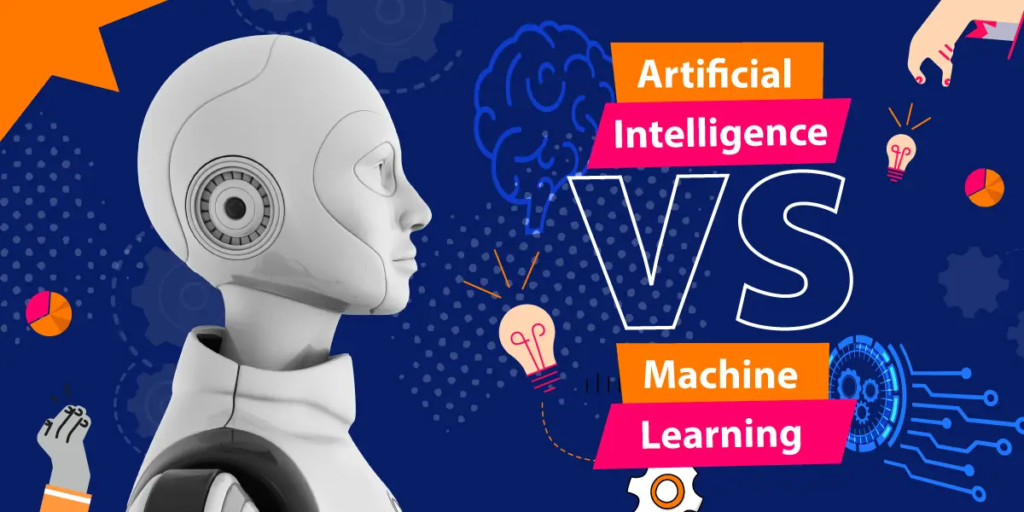Artificial Intelligence (AI) vs. Machine Learning: How Do They Differ?

Have you ever used AI and ML interchangeably? This comparative guide shall be beneficial for you. In today’s tech world, machine learning, and artificial intelligence are popular terms and significant parts of computer science. Even though they are correlated, there are some differences between the two. But does that mean AI skills are different from ML competencies?
This comparative guide will explore these two technologies closely to see their similarities and differences. Given their impact in the tech world, it will also help you understand the importance of AI jobs and how to become an ideal candidate.
What is Artificial Intelligence?
Artificial intelligence encompasses the broad field of computer science, often replicating human cognitive abilities. It focuses on automating various tasks that require human intelligence. In these cases, neural networks perform tasks ranging from generating content in different languages, creating images and codes, recognizing patterns, and solving complex problems.
According to Statista, AI’s market size worldwide has shown staggering growth, with a nearly $50 Billion jump from 2023. In 2024, it reached beyond $184 Billion, with an estimated projection of $826 Billion by 2030. Some examples of these intelligent systems are Chatgpt, GitHub Copilot, and Google Bard.
What is Machine Learning?
ML is a specialized branch within the extensive field of artificial intelligence (AI). It interacts with data over time to learn user behavior and accurately design algorithms. It uses these data-based algorithms to produce AI models to perform complex tasks.
In other words, machine learning equips computers to analyze data by drawing insights and making informed forecasts/ decisions. ML carries these tasks without the need for programming. The machine learning market in 2023 grew by 120%. Statista estimates a steady and continuous 20% growth through most of the 2021 – 2030 decade.
Similarities Between Artificial Intelligence and ML
This is where these two overlaps:
- Machine learning and artificial intelligence are data-driven disciplines. While ML uses data to learn and interact with the user, AI relies on it to make informed decisions.
- Both of these functions work towards automating tasks that require human intervention. For example, machine learning engages with data analysis, while AI generates codes and performs repetitive tasks so the artificial intelligence engineer does not have to.
- Programmers and software work towards advancing these disciplines over time. AI and ML learn from current data, algorithms, and tasks to become more effective in the future.
- Specialized hardware like GPUs are required to carry out complex tasks like machine learning, and AI demands significant computational power.
- The 4 major fields that these disciplines draw from are mathematics, computer science, engineering, and statistics.
Differences Between AI and Machine Learning
Artificial Intelligence |
Machine Learning |
| It has a broader scope and allows a computer to support everything from robotics and problem-solving to language recognition to mimic human intelligence | With a narrow scope, ML learns from data to focus on creating algorithms |
| Focuses on automating all the tasks that require human intelligence | The ultimate goal is to learn from data to help in decision-making and roll out accurate predictions |
| Does not necessarily learn from data | Data is the primary source for learning and improving |
Artificial intelligence systems often work with the help of machine learning; hence, professionals confuse the two as synonymous. However, machine learning is just one way to develop human-like cognitive systems (AI) using computer science.
In simpler terms, artificial Intelligence is the umbrella term within which ML exists as a subset. While all machine learning can be termed AI, not every artificial intelligence function can be categorized as ML. AI exhibits intelligent behavior because ML learns it from algorithms. Hence, these are not interchangeable terms.
However, with the rising market value of AI and ML, it is important to understand their dominance in the job market. Many companies are adopting artificial intelligence to simplify their work. Naturally, the demand for artificial intelligence engineers and top AI/ML certifications is increasing.
Let’s see how to opt for these artificial intelligence certifications and scale your AI career.
Top AI/ML Certifications to Scale Your AI Career
Certified Artificial Intelligence Engineer (CAIE™) by USAII®
For an aspiring artificial intelligence engineer, CAIE™ is one of the best AI certifications. It trains machines to learn from user experience and develop algorithms. An AI engineer also makes the system understand ways to interpret information in relevant ways.
As a combination AI/ML certification, USAII®’s CAIE™ will help you develop an aptitude to tackle real-world problems. From learning machine learning algorithms and pipelines to understanding AI on the cloud, this certification will help you find a scalable AI job.
The cost of this course is $691 (all-inclusive).
Cornell University’s Machine Learning Certificate Program
With AI becoming dominant in all industries, machine learning certifications are also gaining popularity. Cornell University designed a curriculum for this certification by deciding to teach machine learning algorithms using Python.
It is one of the best AI courses for understanding how data scientists approach ML problems. The machine learning certification will also explore the workings of the neural network. By the end of this curriculum, you will be able to learn how to use neural networks to suit different types of data.
The cost of this machine learning certification is $3,750.
Time to Get Your Dream AI Job
These certifications are necessary to get an AI job in a competitive environment today. However, what’s more important to know before starting your AI career is the difference between AI and ML. Now that this guide explores the topic in detail, alongside resources for you to work on, what are you waiting for? Get that AI/ML certification and find your dream AI job.






